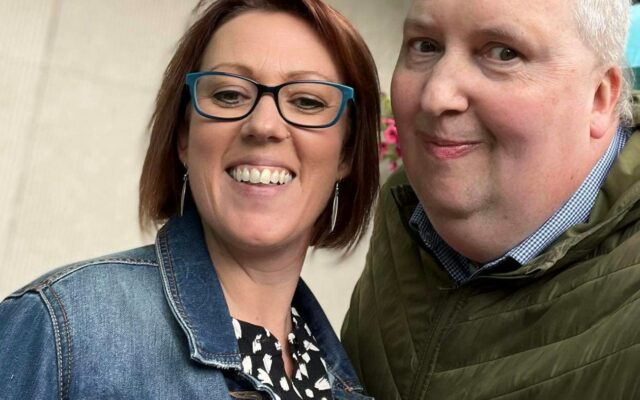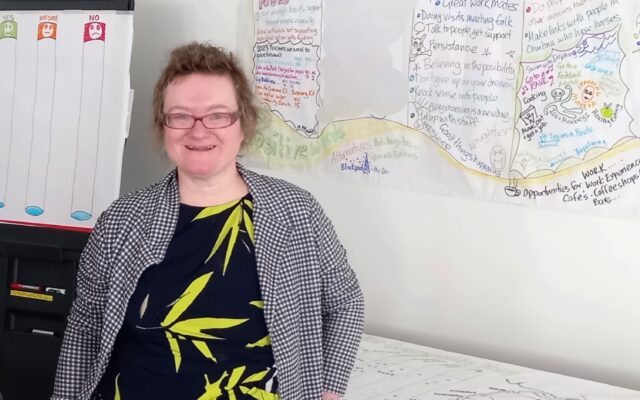Intro: Seán Kelly talks to Richard Williams who believes that helping people with learning disabilities on Merseyside to have a full life is indeed a fabulous thing – despite the pressures on budgets.
It’s not often that you hear of a consultant returning to direct service provision but after five years with leading consultants Paradigm, that is just what Richard Williams did. It’s an unusual step, one I can’t help admiring.
Richard took on the role of CEO with Options for Supported Living working almost entirely with people with learning disabilities in Liverpool and the surrounding areas. That was nine years ago and since I was visiting Liverpool recently I arranged to meet up with him and find out how it is all going. We met up for a very nice lunch at Peter Kinsella’s Spanish restaurant ‘Lunya’ in the heart of Liverpool. Peter, of course, used to be the Commissioner in Liverpool and also led Paradigm so he can’t be disentangled from this story. Happily he joined us for a little while.
Stay local
We talk to a background of flamenco music. Richard tells me that Options is “a Merseyside organisation, wanting to stay local and be fabulous at what we do. For us that means supporting people”. Throughout our discussion he regularly uses words like ‘fabulous’ but in a down-to-earth unflashy way. It encourages a shared belief that being fabulous is a perfectly reasonable aim.
Options provides support for 180 people in Liverpool, the Wirral and across Cheshire. The organisation was set up 15 years ago by Peter Kinsella when he was the local commissioner. Options was one of four small organisations started with seed money of £150,000 “which was not very much even back then”, Peter recalls. Richard says that lots of organisations around seemed to be “sadly driven to be responsive to the system rather than to individuals and what they want in their lives”. Peter had said, OK, let’s create an organisation that genuinely listens to the people we support.
Options has grown significantly since then but still retains an emphasis on staying relatively small and local. Richard says that unlike other organisations driven by expansion “our driver is for people to live their lives to the full”.
So what’s the secret? “Everything comes down to having fabulous staff”, says Richard. Throughout the interview he speaks highly of the staff and it doesn’t seem to be just standard management-speak. “Fundamentally, we say to staff we can’t pay you loads but if you want to make a difference we can support your development to do that”. It provides some of the best trainers from around the world; for example, David Pitonyak has regularly come over from the USA to work with them for about ten years. “One of his headlines is Loneliness Is the True Disability. So we are passionate about people having love, in whatever form, in their lives, in terms of community, friendships and intimate relationships”, Richard tells me. He says this means staff are expected to have ‘big ears’. “There has to be that emphasis on genuinely listening to people but we also say we listen with our ears, our eyes and our hearts”.
One of the main ways for people who use Options’ services to have their voices heard is a group called Voices R Us which has been facilitated for the last ten years by Jill Goodwin. The group meets and says what’s working and what’s not working for them and what their hopes and aspirations are and that gets fed directly to the trustees and to Richard. Richard says the other way that people have a voice is “simply that everyone starts with a person-centred plan which says ‘this is what I want in my life’ and so that shapes how we do things, and that shapes their service. Essentially it’s bespoke support for 180 people. That can’t be dictated from the most senior position, that has to be driven by listening to the person”.
Consistent teams
The organisation backs this up with a commitment to providing consistent small staff teams who can get to know the individual they support really well. The aim is to use no agency staff at all. Options wants staff to feel that they belong to the organisation, says Richard. Their approach includes things he describes as ‘quirky’: “We have a Philosophy Night where we just get a group of maybe a dozen people together, have some food and something to drink and have conversations that just explore where we’re at, what we’re doing, what is working, what is not working, without any scripts, any agenda, without any minutes, or anything like that”. The meetings deliberately take a lateral approach; for example, a recent one began with Peter Kinsella speaking on what he had learnt about social care from running a restaurant!
Options has also invested significantly in Emotional Intelligence training. It is provided with coaching for all managers and for many of the staff. “It’s essentially a language for understanding relationships and ourselves… I think it has made us a more thoughtful organisation and a wiser organisation”. There are also leadership courses for potential leaders among the staff. “They include synchronised dance routines, radio broadcasts…” Richard laughs, “….all the creativity I guess you’d expect from my apprentice-ship with Paradigm”. But he does not believe that leadership can only come from people who are named leaders. An example is a recent event, the organisation’s Picnic in the Park, and Richard pays tribute to a support worker who led a bunch of others to organise the whole day and make all the lunches. “So in the little traditional bandstand we had music playing and in the deckchairs 150 people watching. It was fabulous”.
This emphasis on development and creativity all sounds great (and great fun) but I wonder how long it can be maintained in times of austerity? Richard says that Options has derived some benefit from gradual growth, receiving increased management income while the actual management costs have remained the same. But he knows that the pressure will increase. “Options will need to find a way to stay person-centred but also deliver outcomes for people within manageable finances”. An example he gives is a new block of flats where there will be four people with learning disabilities supported by Options and four other tenants without learning disabilities. People with learning disabilities will still have their own staff teams but will share the night cover. “It means people still have staff who know them well, and listen to them well, which is crucial to good support… but at the same time it provides some of the financial savings the system demands if we’re not going to move back to congregate living”.
Individual mini-tender
Has he had to do many tenders? I ask Richard. He says the approach is different in different areas. Liverpool has recently done a lot of re-tendering of provision. On the other hand in the Wirral they have set up a framework and done things on a more person-by-person basis. This means creating almost an individual mini-tender for each person but it also means many aspects of that can remain the same with only the elements relating to the individual needing to be freshly created each time. At the moment Richard says responding to tenders is not an over-whelming process. He seems to be in a better situation than some CEOs I know in London who say they have done little else apart from tenders over the last couple of years.
As well as supported living the organisation provides a fair amount of outreach support based around social inclusion, including supporting people into voluntary or paid employment, education, friendships, holidays, etc. I wonder if it is this area that is getting cut at the moment? But Richard says that actually there has been some growth in outreach. His rather depressing conclusion is that outreach services are sometimes used by councils to sustain people in the family home, as a form of respite for family carers, whereas ten years ago the individual might have moved into their own home and tenancy.
Richard believes strongly in partnerships: “I mean real partnership working between people with disabilities, their families, providers and commissioners and probably the community as a whole. The history of a lot of learning disability provision has been silo’ed and with how scarce resources are now I don’t think anybody can do anything in isolation. Genuine partnership is the next step”. This seems admirable but hard to achieve in a world of competitive tendering which can encourage lots of organisations to each hold on to their own little bits of good practice. Richard agrees that times have changed. He says, “Years ago you felt you had lots of friends who were sharing the road, sharing the struggles and the opportunities and the learning together. The difference now is that’s much harder and there seem to be fewer folk around”. Options is part of a small supportive group of organisations which meets regularly. “We just share where we are at…. which can include saying ‘Blimey, that was a tough week!’ ”
Richard himself has had a few tough weeks lately as he has faced recent reductions in income, despite winning tenders. He says straightforwardly that the last three months have been the hardest he has ever had. Although Options has made surpluses in recent years it is currently facing a £100K deficit and so on the day we met there was a letter going out to staff “This will reflect on the challenges and opportunities facing the organisation”, he says.
A full life
Richard accepts that maybe some of the team-building type events will happen less frequently but, he emphasises, the biggest factor in making a difference to people’s lives is great staff doing their work well. “So supporting and developing those staff is still the best way to use the limited money available to make the best difference to people’s lives”, he says. We agree that, whatever the financial situation in the world at large, there is still a job to do: people with learning disabilities still need and deserve a full life.
Richard has a persuasive way about him. Sitting and speaking with him he easily makes me feel that helping people with learning disabilities on Merseyside to have a full life is indeed a fabulous thing. He has that great quality that real leaders have of making you feel you want to join in. As we finish he tells me that the turning point which led him to leave consultancy and go back to direct work was when American consultant Lynne Segal one day turned to him and said, “You’re not a consultant, you’re a leader”.
She was right of course. Well said, Lynne!




